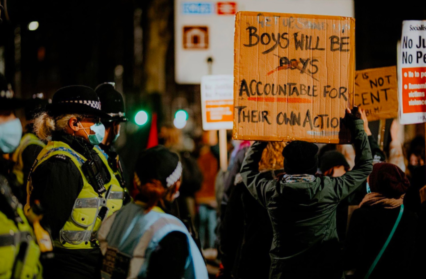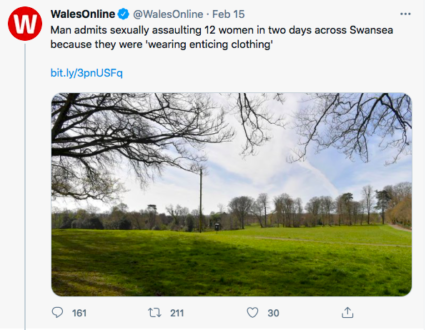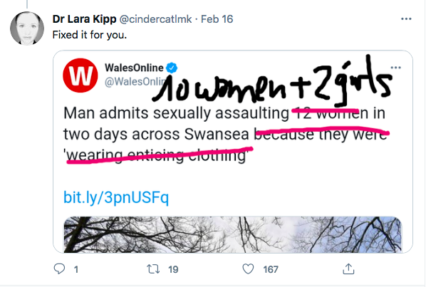Following recent instances of violence against women in Wales, England and the US, Zoë Brigley discusses public gaslighting, examining why men’s statements are often given more weight than women’s, even when those men are the perpetrators of violent crimes.
Content warning: femicide, sexual violence.
The events of the last few weeks in Britain and the US have really brought into focus what women face when pushing back against violence. Just this week, tragic events in Atlanta, Georgia saw the murder of eight people, including six Asian American women. In a statement about the investigation, Captain Jay Baker repeated the perpetrator’s claims that the attacks were not racially motivated, and he described the crimes as being the result of the perpetrator having “a really bad day.”
This statement is actually a form of gaslighting against women and Asian Americans. The term gaslighting has come to be used for any kind of manipulation in public or private spheres, but originally it referred to a technique used by abusers to undermine a person’s confidence in their own experiences and grasp of reality. The term originates from the 1938 play by Patrick Hamilton, Gas Light which was later made into a Hitchcock film. The villain, who marries and murders rich women, tries to make his new wife believe that she is going mad and has lost her grip on reality. He does this by turning down the gas lights, tricking her into believing that this is a figment of her imagination.
When Captain Jay Baker repeats Robert Aaron Young’s claim that the murders were not racially motivated, he denies the long history of problematic representations of Asian women. Violence against Asian American women is not an imagined problem, but a reality that has been excacerbated by ex-president Donald Trump’s rhetoric about the ‘China virus’; it is indisputable that COVID-19 has led to an increase in attacks, especially on Asian American women. It’s clear that Robert Aaron Young targeted his victims just for being Asian American women existing in his vicinity and because of the sexual fantasies he projected onto them. The murdered women were working in massage parlours and were presumed to be sex workers by the killer. Captain Baker noted that the killer “sees these locations as a temptation for him that he wanted to eliminate,” without any pushback as if that is a perfectly understandable motivation. What should have been said is that women have the right to exist in spaces, and that whether these women were sex workers or not, their lives were valuable, unique and a tragic loss.
We might ask why the murderer’s claims are being given such credence and also such sympathy. Captain Baker talked about the murderer’s sex addiction almost sympathetically, and the mention of him just having a “bad day” is chilling. His statement gaslights all women who realize the horror and seriousness of femicide in our communities, as well as the frightening regularity of anti-Asian-American attacks, and also seems to suggest that it is not unreasonable to murder eight people when you are having a “bad day.”
This sympathy to the white, male perpetrator comes as no surprise to me, as in my research I often come across cases such as this. I have written about the 2012 Steubenville High School rape case, a particularly heinous scenario where an unconscious teenage girl was violated in numerous ways by teenage boys who also captured and shared the crimes on film via cellphones. It was a horrible crime, yet the CNN coverage when the perpetrators were convicted saw the reporter lamenting the terrible consequences for the young men involved and their futures. There was no mention of the traumatic consequences for the young woman. Again, this seems to be a kind of gaslighting that foregrounds men’s experiences, men’s losses, and men’s feelings even when they have committed horrible crimes.
A recent case showed that we still have problems with this in Wales too. In a WalesOnline article, the headline read “Man admits sexually assaulting 12 women in two days across Swansea because they were ‘wearing enticing clothing’.”
Just as Captain Jay Baker presented the murderer’s view without criticism in Atlanta, so this article presents the criminal’s perspective almost giving credence to the rape myth that when women are attacked it is their own fault. In fact, what women wear has no bearing on whether they are attacked or not, because sexual violence is not about men being overcome with desire – it is about misogyny, power and control, and women from 8 to 80 experience it, no matter what they wear or do. There is no excuse for sexually assaulting 12 women in two days, and it is gaslighting to suggest that there is.
It is also worth noting that two of the “women” in the headline were actually minors – at 13 and 15 years old, an important distinction, and much of the actual article was taken up with describing the perpetrator’s excuse for what he did which put the blame on the women and children for wearing leggings. There is a long history of blaming women and children for men’s violence, and so often it puts the fault on women for simply existing and having bodies. That WalesOnline repeated these rape myths without challenge is sickening.
This case also has parallels with discussions in the wake of the tragic Sarah Everard murder in London. Everard was abducted whilst walking, and movements like Reclaim the Streets are asking questions about why women are forced to put up with these risks, why the responsibility is put on potential victims of violence rather than perpetrators. This is also a form of gaslighting, since women cannot avoid moving through public spaces. Placing the onus on women to adapt their behaviours shifts the blame away from the culture of misogyny and entitlement – even when this is what really needs to be challenged. The actions taken by the London police force, opting to crack down hard on the subsequent protests, felt especially ironic considering that Sarah Everard’s murder was potentially committed by a police officer, and one who had offended before at that. Again, this is a form of gaslighting – with officials behaving as if the women protesting are making a fuss about nothing, as if they are reckless or illegitimate, when the truth is that this issue could not be more important to the safety of women, especially women of colour. The same was also true of the #BLM protests which appeared around the world last summer, many of which were framed as violent and unnecessary, or even as acts of terrorism.
The fact is that the violence that women and minorities experience is not a figment of our imaginations. When the gas lights turn down, we are not just imagining it, and we refute this framing of white men’s speech as the only speech to be taken as legitimate. The fact is that our institutions – our courts, out police, and our media – need to be more aware of the harm they cause when they fail to recognize the lived inequalities of women and women of colour. Failure to do this is known as the “second violation” or “double violation,” where more harm and hurt is piled on top of the original violence, because institutions fail to recognize the damage done.
This simply isn’t good enough. One of the first steps that we can take however is to recognize where and when gaslighting is taking place. We need to scrutinize what institutions are telling us, and recognize this signature gaslighting move when the experiences of women and minorities are sidelined and erased, and the viewpoints of violent white men are given more credence. We are not imagining the violence that is happening. We are not imagining racism and misogyny. We are not imagining that institutions often seem completely useless in condemning violence or that they even seem sympathetic to white male perpetrators. And out of this refusal to erase our own experiences, we might bring about real change.
Zoë Brigley is assistant professor in English and Sexuality Studies at the Ohio State University. Her most recent poetry publications are Hand & Skull, and Aubade After A French Movie. She also has a nonfiction collection, Notes from a Swing State: Writing from Wales and America.
Photograph by Nathan Roach/Coal Poet.














